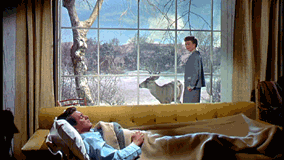|
Newest Reviews:
New Movies -
The Tunnel
V/H/S
The Tall Man
Mama Africa
Detention
Brake
Ted
Tomboy
Brownian Movement
Last Ride
[Rec]³: Genesis
Hara-Kiri: Death of a Samurai
Indie Game: The Movie
Abraham Lincoln: Vampire Hunter
Old Movies -
Touki Bouki: The Journey of the Hyena
Drums Along the Mohawk
The Chase
The Heiress
Show
People
The Strange Affair of Uncle Harry
Pitfall
Driftwood
Miracle Mile
The Great Flamarion
Dark Habits
Archives -
Recap: 2000,
2001, 2002,
2003, 2004
, 2005, 2006,
2007 , 2008
, 2009 ,
2010 , 2011 ,
2012
All reviews alphabetically
All reviews by star rating
All reviews by release year
Masterpieces
Screening Log
Links
FAQ
E-mail me
HOME
| |
All That Heaven Allows (Douglas Sirk) 1955
 Cary (Jane Wyman), the widowed protagonist of Douglas Sirk’s suburban
melodrama All That Heaven Allows is a
bit too sexually healthy for her own good. Set in the 1950’s in the
repressive, fictional town of Stoningham, New York, the film suggests Sirk, who
fled Nazi Germany to begin a directorial career in the United States, found only
a more subtle form of moral subjugation in America. There’s so little
breathing room in the streamlined plot of this 89-minute movie that the
procession of events almost feels as oppressive to us as it must to Cary. The
way that she throws herself upon the hunky Ron Kirby (Rock Hudson) does feel a
bit shameful, if only because their relationship isn’t developed much beyond
their obvious mutual sexual attraction. Sirk’s compassion for his heroine
becomes contagious, however, and by the end of the film, the soap opera fodder
that fuels the plot has becomes something more rarefied and moving. Much of the
film’s success has to do with the way that Sirk slightly pushes his Heaven’s
world into abstraction. The lush colors that surround Cary have a way of
becoming blatantly expressionistic whenever her emotions heighten. Her wardrobe
similarly reflects her state of mind, constraining her in a dull gray when
she’s being judged by her uppity friends, and flaring red when she’s at her
ripest. In a world where everyone is obsessed with “keeping up with the
Joneses,” it makes perfect sense that material possessions not only show us
how characters define themselves, but also how others perceive them.
Cary (Jane Wyman), the widowed protagonist of Douglas Sirk’s suburban
melodrama All That Heaven Allows is a
bit too sexually healthy for her own good. Set in the 1950’s in the
repressive, fictional town of Stoningham, New York, the film suggests Sirk, who
fled Nazi Germany to begin a directorial career in the United States, found only
a more subtle form of moral subjugation in America. There’s so little
breathing room in the streamlined plot of this 89-minute movie that the
procession of events almost feels as oppressive to us as it must to Cary. The
way that she throws herself upon the hunky Ron Kirby (Rock Hudson) does feel a
bit shameful, if only because their relationship isn’t developed much beyond
their obvious mutual sexual attraction. Sirk’s compassion for his heroine
becomes contagious, however, and by the end of the film, the soap opera fodder
that fuels the plot has becomes something more rarefied and moving. Much of the
film’s success has to do with the way that Sirk slightly pushes his Heaven’s
world into abstraction. The lush colors that surround Cary have a way of
becoming blatantly expressionistic whenever her emotions heighten. Her wardrobe
similarly reflects her state of mind, constraining her in a dull gray when
she’s being judged by her uppity friends, and flaring red when she’s at her
ripest. In a world where everyone is obsessed with “keeping up with the
Joneses,” it makes perfect sense that material possessions not only show us
how characters define themselves, but also how others perceive them.
 Sirk’s film is filled with such satirical barbs at the
American rat race, and horrifyingly enough, most of his attacks feel unusually
prescient. Cary’s children and friends implore her, asking that she buy a
television so that she not be lonely, and in Sirk’s hands the purchase of the
set seems equivalent to zombification. In another sharply observed scene, a
doctor attempting to rattle Cary from her depression tells her that he can’t
“prescribe a pill to cure life.” Of course nowadays, the wonders of modern
medicine have made this scene outmoded: a modern day Cary would probably become
a zombie through medicinal means. The subversive Sirk never overplays his hand,
though, and these broad social observations could easily be dismissed as
specifics to those not attentive to the film’s larger concerns. Thankfully,
the plot is engaging and flab-free enough to entertain even those with their
brains shut off. The performances aren’t exactly great, but their mannerisms
only further enhance the feeling that they are emotionally inhibited. If
Sirk’s achievements seem to have been somewhat inflated because they took
place in the Hollywood studio system, there’s little denying that he does
plenty right in All That Heaven Allows.
Sirk’s film is filled with such satirical barbs at the
American rat race, and horrifyingly enough, most of his attacks feel unusually
prescient. Cary’s children and friends implore her, asking that she buy a
television so that she not be lonely, and in Sirk’s hands the purchase of the
set seems equivalent to zombification. In another sharply observed scene, a
doctor attempting to rattle Cary from her depression tells her that he can’t
“prescribe a pill to cure life.” Of course nowadays, the wonders of modern
medicine have made this scene outmoded: a modern day Cary would probably become
a zombie through medicinal means. The subversive Sirk never overplays his hand,
though, and these broad social observations could easily be dismissed as
specifics to those not attentive to the film’s larger concerns. Thankfully,
the plot is engaging and flab-free enough to entertain even those with their
brains shut off. The performances aren’t exactly great, but their mannerisms
only further enhance the feeling that they are emotionally inhibited. If
Sirk’s achievements seem to have been somewhat inflated because they took
place in the Hollywood studio system, there’s little denying that he does
plenty right in All That Heaven Allows.
* * * 1/2
04-25-02
Jeremy Heilman
|